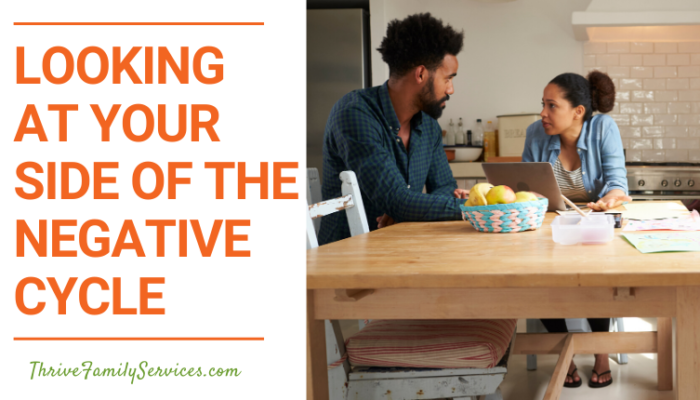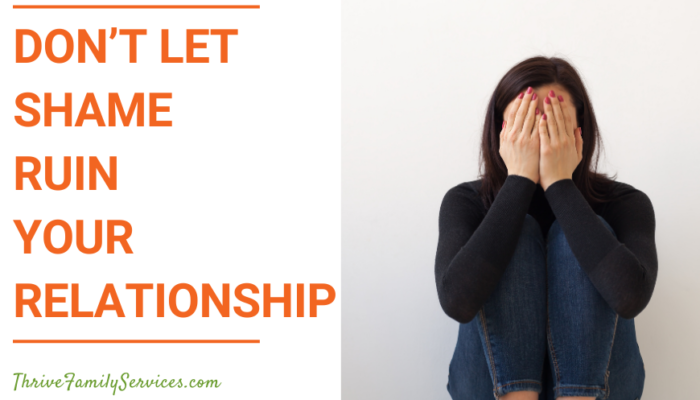If you have a significant relationship in your life, then you’ve probably experienced a negative cycle. Negative cycles are any repeated pattern of interaction that leaves you (and your partner!) in a bad place emotionally and relationally.
Negative cycles often get couples stuck in a space that can feel difficult to repair. Sometimes, couples want to understand what went wrong, but they aren’t sure how to initiate a conversation with each other. Other times, couples just let the negative cycle die down until their emotions settle down.
One thing is true: Repairing disconnection is infinitely important to the well-being of any relationship. Otherwise, miscommunication, hurt feelings, or resentment can build up and perpetuate feelings of disconnection.
One of the most successful ways to be able to learn from and change your negative cycle is to look at your own side of it. What are you doing that perpetuates the disconnection? What are the understandable reasons you are you doing this, even if the outcome is not what you want? Can you share this insight with your partner?
Figuring out your patterns of disconnection is incredibly beneficial to understanding and changing these negative cycles. After all, it is a lot harder to improve something if you don’t understand the way it currently operates!
In order to process your part of the negative cycle, there are six steps to follow: identify the trigger, name your physiological response, label your emotions, notice your meaning-making, connect your internal response to your behavior, and share with your partner. Following these steps can give you and your partner the insight and awareness needed to feel a stronger sense of power over the negative cycle.
Let’s break down each step to process your part in the negative cycle:
1. Identify the Trigger
What was the triggering event that made you first feel like something went wrong? Was it when your partner let go of your hand? Was it when your partner raised their voice? Was it when your partner walked away?
Paying attention to the activating event that started the disconnection in your mind is important data for understanding your half of the cycle. After all, you and your partner need to know what you saw or heard that led to the reaction that you gave. It’s the beginning link in the chain of events that creates the negative cycle.
2. Name Your Physiological Response
Like any external stimuli, the trigger that started the negative cycle in your mind has an impact on your body. Maybe your heart started to race. Maybe your stomach tightened into knots.
This is important information to have because it’s the first signal you get from your body that something is wrong. Ignoring this information is like ignoring the alarm bells before the Titanic hit the iceberg. Your body is saying, “This doesn’t feel good, something is wrong!”
3. Label Your Emotions
Once the trigger happened, what emotion did you feel? Did you feel angry, sad, ashamed, scared, or hurt? Maybe a mixture of a few different feelings?
Believe it or not, just the act of naming your emotions has the power to be able to diffuse their intensity and to help other people more accurately understand how you were impacted.
This isn’t the time to explain, justify, or defend your feelings. Just try to identify what it is that you felt and put a name to it. Feelings are always valid, whether they make cognitive sense or not!
4. Notice Your Meaning Making
Meaning-making is the part where you start to connect the dots between the “trigger” and the “emotion.” Not everyone reacts to a certain word choice, facial expression, or behavior the same way you do. The stimulus that can become a trigger for a negative cycle for you – and what you feel and do in response to that trigger – is unique to your past. This is why it is important to think about how the meaning you make of a certain behavior makes you react the way you do.
Here are some examples of meaning-making:
- I thought you hated me
- I felt like I was too much for you/not good enough for you
- I felt abandoned/rejected
- It felt like I was powerless/had no influence
- I thought you were telling me that you wanted to leave the relationship
- I felt alone/unloved
The meaning that you make from a certain trigger happens almost instantly. It can feel impossible to slow down this moment as it is happening to stop yourself from making this meaning.
The reason why it can feel so instinctual to make meaning out of your partner’s words or behavior is usually that it feels similar to a spot we learned to be sensitive to in the past.
For example, a child with divorced parents might be sensitive to messages of rejection. Trauma survivors might become sensitive to messages of losing control. Because of these sensitivities, our brains are working in overdrive, scanning our environment and interactions for these messages to keep us “safe.”
5. Connect Your Internal Response to Your Behavior
In order to keep us “safe” from these sensitivities, humans adopt a way to cope with these feelings and meanings. In other words, realizing what action you use to stay safe when you feel a certain way is crucial in being able to slow down the negative cycle.
For example, you might realize that you get defensive when you feel the pain of rejection because it puts the blame on someone else. Your partner might realize that he or she problem-solves when they feel a fear of not being enough for you. Understanding this can help you learn to name what is happening internally rather than just getting defensive.
Being able to connect your actions to your internal world is a great way to learn more about yourself – and to help your partner know more about you, too!
6. Share with Your Partner
Finally, in order to start conquering the negative cycle as a team, you can tell your partner about your trigger, bodily response, emotion, meaning-making, and behavioral reaction. If you share this information about yourself in a non-defensive, non-blaming, and non-shaming way, you and your partner can start to catch the “warning signs” of your negative cycle and talk about what is happening to avoid the disconnection from sweeping you up.
- A defensive way to share might sound like saying, “I shut down when I get scared, but lots of other people do, too.”
- A blaming way to share might sound like, “I only shut down because you started yelling. If you would learn to watch the tone of your voice, we wouldn’t have this problem.”
- A shaming way to share could sound like saying, “I am the worst partner because I just shut down when I feel scared. I act like such a baby sometimes. You must hate me.”
Here’s an example of a way to share your part in the cycle with your partner that has a better chance of leading to connection and stopping the negative cycle:
“When I heard you raise your voice, my heart dropped to my stomach. I felt scared that I had disappointed you. It reminded me of growing up, how I used to get in trouble any time I didn’t live up to my mom’s expectations for perfection. It made me want to shut down and hide because that’s what I had to do growing up to not get yelled at more.”
The reason why negative cycles happen is because of an innate need to feel connection. However, when we try to get connection in ways that our partner doesn’t understand (like shutting down when feeling like a disappointment), it is easy to see why the negative cycle wins.
Understanding and communicating why you do what you do is necessary to be able to truly build connection and stop the negative cycle.
If you and your partner are stuck in a negative cycle, our Greenwood Village couples counselors can help you figure out your side of the negative cycle.




